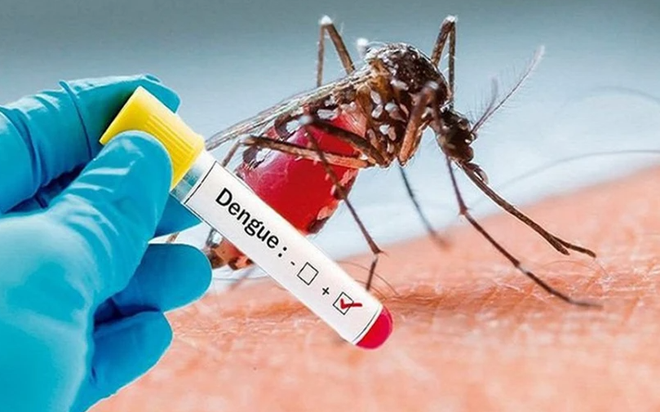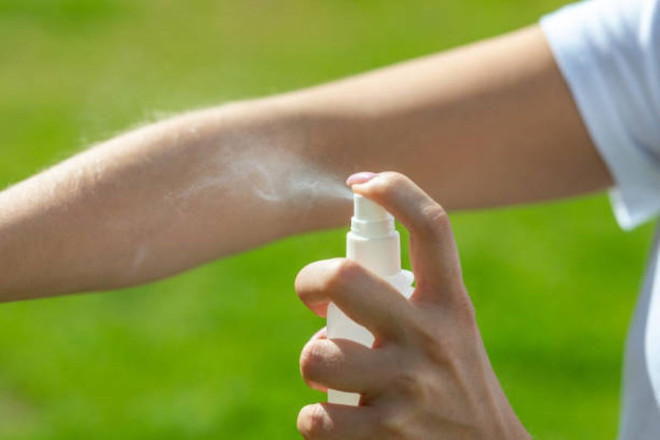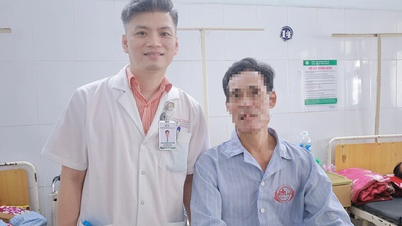When caring for or treating dengue fever patients, many people make common mistakes that make the condition worse, easily leading to dangerous complications.
Here are common mistakes and why they should be avoided.
Subjective psychology
Dengue fever is divided into 3 levels: mild, with warning signs and severe. Some mild patients can be treated as outpatients but need to have regular check-ups according to the doctor's appointment because the severity can change at any time.
Dengue fever with warning signs and severe dengue fever require hospitalization for treatment and close monitoring. Therefore, if the patient is treated as an outpatient or has been diagnosed with dengue fever, they should not be subjective but should return for a follow-up visit as scheduled by the doctor to promptly detect serious complications and provide appropriate treatment.
Using fever-reducing medicine incorrectly
A common mistake in caring for dengue fever patients is using aspirin, ibuprofen, or nonsteroidal anti-inflammatory drugs (NSAIDs) to reduce fever.
Using this incorrectly will increase the risk of bleeding, stomach damage, and blood clotting disorders.
Instead of using medicine on your own, you should give the patient a fever reduction by using paracetamol in the correct dose as directed by the doctor.

No fever means cured
The most dangerous stage of dengue fever is when the patient has just gone fever-free. Therefore, the patient has a completely wrong mentality that once the fever is gone, the disease is cured, and does not go to a medical facility for treatment.
This has led to many unfortunate consequences such as serious complications occurring, seriously affecting the patient's health such as plasma leakage, dengue shock (usually after the fever has subsided). Therefore, even if the fever has subsided, the patient still needs to be closely monitored for the next 2 days to minimize complications.
Self-infusion at home
Improper infusion or without professional medical supervision can cause serious consequences such as edema, acute respiratory failure, and even directly threaten the patient's life. This is a problem that many people often ignore. It can lead to pulmonary edema, respiratory failure, and shock due to excessive infusion.
Therefore, family members should only give patients IV fluids when prescribed by a doctor and performed at a medical facility.
Drinking too little water or not replacing electrolytes
Ensuring that the body is always adequately hydrated is one of the key factors contributing to improving health and effectively supporting the treatment of dengue fever.
Patients should prioritize drinking a variety of fluids such as purified water, vitamin-rich fruit juices, or typical rehydration and electrolyte solutions such as ORS, to minimize the possibility of severe dehydration. At the same time, it is important to stay away from drinks containing stimulants such as tea, coffee, or carbonated soft drinks.

Let the patient exercise early, eat and drink improperly
Many people often think that after recovering from illness they can quickly return to work or study.
However, this is not the right thing to do. People who have just recovered from an illness should prioritize complete rest until their body has fully recovered, ensure a nutritious diet, and avoid strenuous activities for at least a week after recovery.
A person only gets sick once in his life.
Dengue virus exists in four serotypes, designated D1, D2, D3, and D4. Each serotype has similar disease-causing potential. Immunity developed after infection with one serotype is protective only against that serotype and does not provide cross-immunity between other serotypes.
Theoretically, this means that an individual can get dengue fever multiple times in their lifetime if infected with different serotypes. Dengue fever is considered a serious disease with diverse clinical manifestations. In many cases, the most dangerous stage of the disease coincides with the time when the patient has just recovered from fever.
Therefore, it is not recommended to self-treat dengue fever at home because of the risk of severe progression. Patients need to go to medical facilities for examination and follow the instructions and supervision of specialists to minimize the risk of complications.

What to do to prevent dengue fever infection?
To reduce the risk of getting sick, you can take the following measures to prevent dengue fever.
Dengue fever vaccination
Vaccination is an active and effective disease prevention method for both children and adults.
Qdenga vaccine of Takeda Corporation (Japan) has been officially approved for circulation by the Vietnamese Ministry of Health from May 15, 2024. This is a live attenuated vaccine, capable of effectively protecting against all 4 strains of Dengue virus that cause the disease.
Avoid traveling to epidemic areas
It is important to limit travel or movement to areas at risk of dengue fever, especially in tropical and humid climates with high rainfall, which create favorable conditions for mosquito breeding.
Use mosquito repellent products
Using insect repellent products such as sprays, mosquito repellent creams or mosquito coils is an effective way to prevent mosquito bites. However, it is necessary to prioritize choosing products with clear origins and tested for safety to minimize the risk of skin irritation or unwanted side effects.

Wear long sleeved clothing
To reduce the risk of skin exposure to mosquitoes, wear long sleeves and long pants, especially during early morning and late afternoon, when mosquitoes are most active.
Create a living environment that limits mosquito breeding
Stagnant water sources such as ponds, unused water tanks or discarded items such as bottles should be eliminated to prevent mosquito breeding. In addition, it is recommended to use mosquito nets when sleeping, install mosquito screens and make use of air conditioning if possible to minimize the risk of mosquito bites.
Isolate people with dengue fever
Sick people should rest in private spaces and use mosquito nets to avoid mosquito bites. When mosquitoes suck blood from sick people, they can carry the virus and spread the disease to others.
Proactively applying the above measures will help protect your family's health and reduce the risk of spreading dengue fever./.
Source: https://www.vietnamplus.vn/nhung-sai-lam-thuong-gap-khi-mac-sot-xuat-huyet-post1039698.vnp


























![[Photo] Nghe An: Provincial Road 543D seriously eroded due to floods](https://vphoto.vietnam.vn/thumb/1200x675/vietnam/resource/IMAGE/2025/8/5/5759d3837c26428799f6d929fa274493)








































































Comment (0)